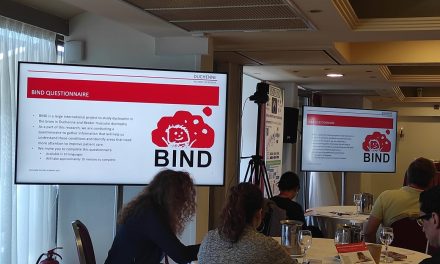Weerkamp, P. M. M., Collin, P., Maas, R. J., Vermeulen, R. J., Klinkenberg, S., & Hendriksen, J. G. M. (2021). Psychosocial adjustment in adults with Duchenne muscular dystrophy: A pilot study on a shortened parent-report questionnaire
Neuromuscular disorders: NMD, 32(2), 159–165. https://doi.org/10.1016/j.nmd.2021.10.008
Lay Summary
Duchenne muscular dystrophy (DMD) is a genetic disorder that affects muscle strength and function. While the physical symptoms of DMD are well-known, the psychosocial aspects of the condition, including emotional well-being and social adjustment, are less understood. The paper titled “Psychosocial Adjustment in Adults with Duchenne Muscular Dystrophy: A Pilot Study on a Shortened Parent-Report Questionnaire” investigates the psychosocial adjustment of adults with DMD and proposes a shortened adult version of the Personal Adjustment and Role Skills Scale (PARS-III) questionnaire.
In this pilot study, researchers aimed to describe the clinical utility and psychometric properties of an adult version of the28 item PARS-III. This scale was originally developed to assess psychosocial adjustment in children 4–18 years of age and has been applied in boys with Duchenne muscular dystrophy (DMD) and was found to be reliable and valid. In the current study, the original questionnaire was completed by 90 parents or informants of men with DMD (mean age: 23.54). The PARS- III assesses six domains of psychosocial adjustment i.e., dependency, peer relations, anxiety, productivity, withdrawal, and hostility.
The 28 items of the PARS-III were rated by three experts, one parent, and one adult with DMD to indicate appropriateness of the items for adults. For 22 items, there was consensus among the raters. Results of the Confirmatory Factor Analysis show an acceptable fit and closely resembles the original factor structure of the PARS-III, thereby justifying the use of the previously identified six subscales of psychosocial adjustment.
Using the PARS-A we found that adult males with DMD score higher on the PARS items than children and adolescents, suggesting better psychosocial adjustment with older age and thus showing better coping mechanisms despite the progressive nature of DMD. Interpretation of comparisons between adults and children on the six domains should be done with caution.
However, our preliminary data show that the current 22 item PARS-A is a valuable, reliable, and valid screening of psychosocial adjustment in adult DMD patients older than 18 years. As of their increased life expectancy, closely following up transition from childhood into adulthood is highly essential in the care for Duchenne patients Since the structure of the PARS-III and PARS-A is similar, it is possible to monitor patients psychosocial functioning into adulthood. Our suggestion is to assess children and adolescents with DMD with the PARS- III (as recommended by the Standards of Care), and adult males with DMD with the 22 items of the PARS-A. In using an adjusted –adult- version of the previously reported childhood version, continuity of assessment and follow up can be guaranteed in this clinical population. The PARS-A is a new, essential, and easy to administer screening instrument to be included in clinical practice. The preliminary cutoff score of 59.1 should be used with caution, but if a patient obtains a score below this cut-off point, further clinical driven assessment is advised.
It is important to note that this study was a pilot study with a small sample size, and further research with a larger and more diverse population is needed to validate the findings and the effectiveness of the shortened questionnaire. Nonetheless, this study provides a valuable starting point for exploring the psychosocial aspects of DMD and emphasizes the need to consider holistic care and support for individuals living with the condition.







